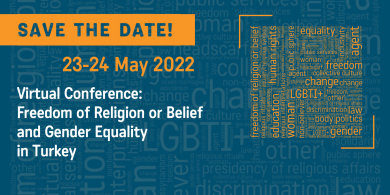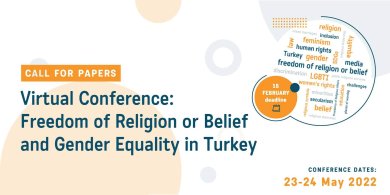Promoting Freedom of Religion or Belief and Gender Equality in the Context of the SDG’s
The Turkish translation of 'Promoting Freedom of Religion or Belief and Gender Equality in the Context of the Sustainable Development Goals: A Focus on Access to Justice, Education and Health' report is published.

Written by Dr. Marie Juul Petersen, the Danish Institute of Human Rights‘ report, presents a basic introduction to the relationship between freedom of religion and belief (FoRB) and gender equality and analyses these in the context of sustainable development goals (SDGs). The Report was translated by the Freedom of Belief Initiative into Turkish. A series of workshops were organized with experts to explore the nexus between FoRB and gender equality in relation to different SDGs and recommendations and concrete suggestions were formulated for action in each of these contexts. The report provides a snapshot of the examples, experiences and ideas discussed in the workshops and encourages further research and analysis.
More specifically, the report aims to:
- Contribute to the clarification of the relationship between FoRB and gender equality;
- direct attention to, and provide concrete examples of, some of the conflicts, parallels and intersectionalities between FoRB and gender equality in the areas of health, education and access to justice;
- point to good practices in addressing these challenges;
- and formulate general recommendations and ideas for action in this field.
According to the study, despite obvious overlaps, actors working for the promotion of respectively FoRB and gender equality rarely work together. In fact, rights related to FoRB and gender equality are often seen to be in contradiction with one another. Yet, the report highlights that this (mis)perception of a normative clash between the two is very often an understanding of FoRB as a right that protects religion – and often conservative, patriarchal religion. For some, this means that FoRB is seen as an inherent obstacle to achieving gender equality; for others, gender equality is seen as a threat to the protection of religious values and practices.
This antagonistic construction of the two human rights norms has consequences:
- A lack of attention to, or an unwillingness to engage with, the intersections between FoRB and gender equality may result in unnecessary clashes;
- unsatisfactory handling of factual conflicts;
- lost opportunities for synergies, learning, and cooperation among actors engaged in the promotion of respectively FoRB and gender equality.
Ultimately, this disadvantages the very people these rights are meant to protect, not only in terms of legal protection gaps, but also in terms of strategies and projects that fail in their understanding of and sensitivity to the needs, wishes, experiences and specific vulnerabilities of the many millions of people “whose life situations fall within the intersection of discrimination on the grounds of their religion or belief and discrimination on the ground of their gender.”
Seeking to address these challenges, in March 2019, the Foreign Ministries of Denmark and Norway launched the aforementioned Expert Consultation Process on Freedom of Religion or Belief, Gender Equality and the Sustainable Development Goals. The process involved more than seventy secular and faith-based experts from over thirty countries, representing a variety of different institutional, professional, religious, and geographic backgrounds.
This was an explorative process that sought to analyse the relationship, and identify positive synergies, between freedom of religion or belief and gender equality in the contexts of health, education and access to justice.
The report, which summarizes the discussions, analyses, opinions, and recommendations that emerged from the workshops on access to justice, education and health includes:
- Reflections on the relationship between rights related to FoRB and gender equality; different ways in which this relationship plays out, distinguishing between different kinds of discrimination and different kinds of actors involved; the role(s) of religion in these challenges;
- an introduction to Agenda 2030 for Sustainable Development Goals, briefly outlining the reasons for situating the analysis of FoRB and gender equality within this framework;
- analyses of the relationship between FoRB and gender equality in the contexts of respectively access to justice (SDG 16), education (SDG 4) and health (SDG 3), pointing to some of the key challenges in each of these areas and directing attention to good practices in dealing with these;
- a set of recommendations, cutting across all three thematic areas, as well as selected ideas for action in these areas.
Please click here to read the report.



